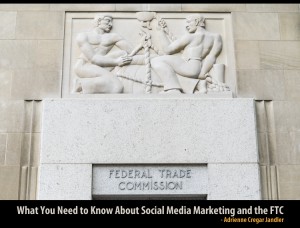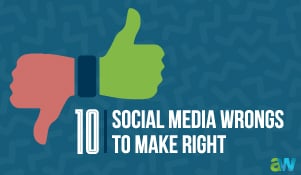 The Federal Trade Commission, recognizing that more and more people are using social media to find products and services (and that businesses are marketing to them through social channels), have recently updated their guidelines as to what can and can’t be done in specific areas.
The Federal Trade Commission, recognizing that more and more people are using social media to find products and services (and that businesses are marketing to them through social channels), have recently updated their guidelines as to what can and can’t be done in specific areas.
For the most part, adhering to these laws is common sense – it’s mostly a matter of being open and honest with buyers. However, there are a few details you’ll definitely want to be aware of and be sure you comply with:
Full Disclosure is Mandatory
It’s not uncommon to see social media “contests” that are really marketing promotions in disguise, and sponsored content that’s being passed off as genuine word-of-mouth advertising. Both of these practices are now explicitly against FTC guidelines.
Full disclosure, especially when it comes to the rules of the contest and which social posts are advertising, is now mandatory. What’s more, the authorities have preemptively explained that using character limits (like those imposed on Twitter) won’t be accepted as an excuse for trying to get around the rules. Even if it’s something as simple as “#sponsored,” you need to designate paid marketing as such.
Buying a Following is a Punishable Offense
Want to boost your company’s credibility by instantly buying thousands of new followers, or likes, on your favorite social media site? Not so fast – paying for false endorsements is now considered “deceptive advertising” and could land you in lots of hot water.
The reason is simple: when you have a large social following, it is implied that your product or brand is popular. If that’s not the case, then you are effectively trying to trick the buying public, which is never acceptable.
Reviews Need to be Genuine and Impartial
In the same way, having employees and other paid individuals write reviews on your behalf falls outside the guidelines of what is acceptable, as well. Reviews need to be written by actual customers who tried your products or services.
Note that you are allowed to incentivize buyers to write reviews (with samples, discounts, etc.), but the reviews themselves need to be impartial. In other words, it’s okay to give a customer something extra for leaving their feedback, but that “extra” can’t be contingent upon the review being a favorable one.
By enacting a new set of rules, the FTC is making it clear that they don’t want to see you engaging in deceptive marketing, online or off… and that they’re willing to fine or otherwise punish companies that don’t seem to have the right kinds of ethical standards. Disclosing things about your relationships with sponsors, and who is writing your reviews, is no longer just a best practice, it’s a way to keep your company out of trouble.
Are you looking for expert help with social media or internet marketing? Atlantic Webworks would love to help you - contact our team today to schedule a free consultation.








Leave a comment